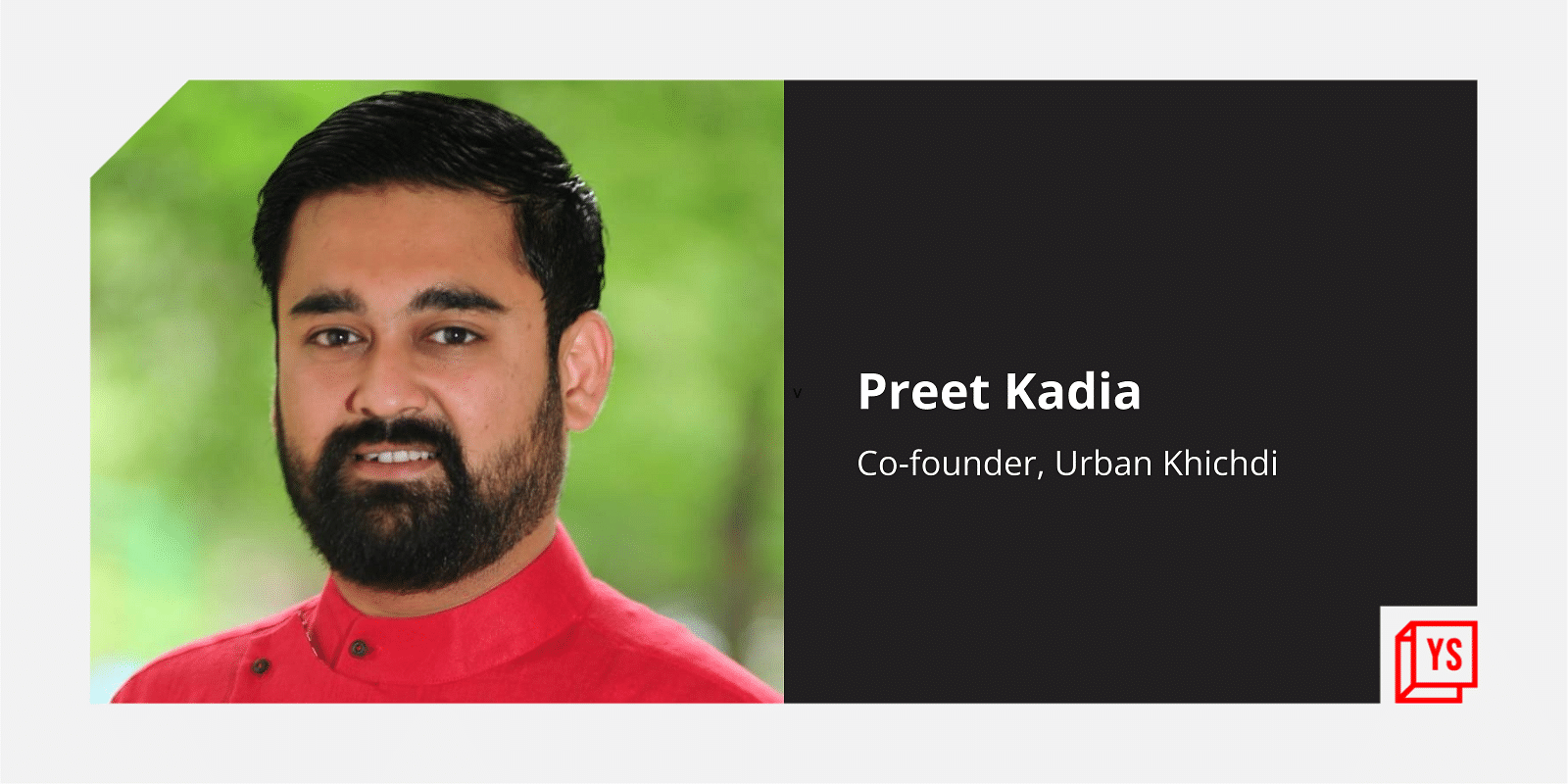While studying hotel management in Delhi and Agra, Preet Kadia was often away from home. One evening when deciding with his roommates, who were from different states, about what to eat, he realised that “no matter where you are from, you relate to khichdi.”
Preet is the co-founder of Urban Khichdi, a startup giving the humble comfort food a makeover.
The entrepreneur says moving back to his home in Ahmedabad towards the end of 2010, after completing graduation from Oberoi Center for Learning and Development (OCLD) and working at different jobs, opened his eyes to new opportunities.
Ahmedabad had become a metro and the influx of information technology (IT) firms brought in people from across the country.
“Suddenly, there was an increase in the number of people for whom cooking at home was a luxury. Then, the same question came back to me – sabko kya pasand aata hai? (what is something that everyone likes) and the answer was khichdi,” says Preet.
Team Urban Khichdi
What’s on the menu?
Founded in 2018 by school friends, Preet and Meet Lakhani, Ahmedabad based Urban Khichdi aims to provide comfort food.
Started with one outlet near IIM-Ahmedabad, the startup quickly added three more stores over three years.
Urban Khichdi also launched three brands under its portfolio —Dakshination, which serves South Indian food, Patiala Platter, which focuses on North Indian food, and Doughfather, which is a pizza chain.
“We venture into foods and cuisines which are meant to be affordable. We drive quality and consistency through very detailed processes,” says Meet.
Dakshination has three outlets, while Doughfather has one. Patiala Platter operates as a cloud brand from all Urban Khichdi kitchens.
The founders decided to roll out its other brands after realising that, while khichdi was selling well, the startup could earn more revenue by exploring non-khichdi dish.
The startup works on a franchise-owned and company-operated model. Urban Khichdi also has an in-house training modules to train its team members across outlets.
“The problem with the current market was that the majority of the franchise owners are not from the f&b background. What happens in our model is that the company owner becomes an investor in one store. However, 100 percent of the operations, from training to book-keeping, from staffing to re-hiring is our headache,” explains Preet.
According to the co-founder, the startup’s model helps it deal with two things—train franchise owners and control product quality.
Urban Khichdi started with 50 varieties of khichdi including Khichdi Sizzlers and Khichdi Cheese Balls, and its best-selling product is Dal Khichdi.
“Khichdi is the new biryani,” the co-founder adds.
“We always thought khichdi needed a facelift and tried a variety of fusion dishes, but our best sellers are the basics,” says Preet.
Urban khichdi being the oldest brand sees the most traction, closely followed by Dakshination, the startup said. The dine-in menu at Urban Khichdi and Dakshination starts at Rs 99, and at Rs 129 for Doughfather and Patiala Platter.
Urban Khichdi says it witnesses 100 orders per day per outlet, while Dakshination gets 60 orders per day per outlet.
Future Plans
The foodtech market in India was valued at Rs 289.36 billion in 2019 and is expected to reach Rs 1,868.19 billion by 2025, expanding at a compound annual growth rate (CAGR) of 39 percent during the 2021 – 2025 period, a CRI report said.
Rapid urbanization, growth in the number of working youth, and increased adoption of the internet and smartphones are a few of the significant factors that propel market growth, the report added.
Bootstrapped since inception, Urban Khichdi only raised its first round of funding of Rs 2.5 crore in September 2021.
The startup will be launching two Urban Khichdi outlets, and two Dakshination in Gujarat within this quarter. The startup is also looking to raise additional Rs 30 crore over next 2-3 years to expand to cities like Bengaluru, Pune and Gurugram which are corporate hubs.
Urban Khichdi will then expand to cities with a high presence of non-residents. These would include Manipal, and Kota, Preet says.






![Read more about the article [Funding alert] No-code AI startup Obviously AI raises $3.6M in seed round](https://blog.digitalsevaa.com/wp-content/uploads/2021/05/Imageopwm-1611036451768-300x150.jpg)



